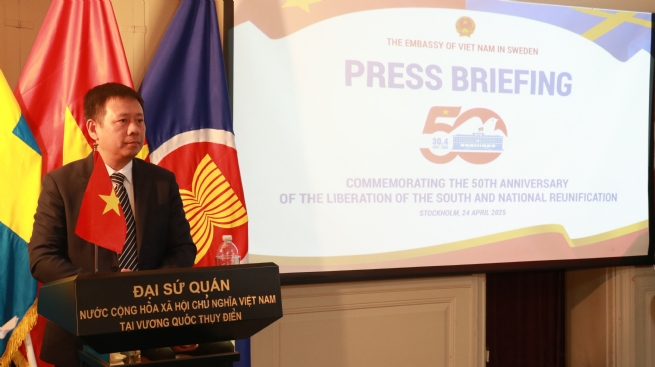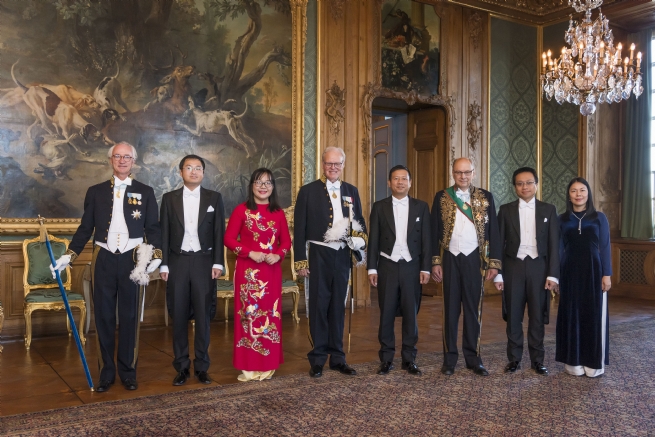9:31:36 AM | 5/12/2025
Sweden’s support for Vietnam’s green and digital transition has been consistent and significant. Increasingly, Swedish companies are considering Vietnam an investment destination in these fields. Against the backdrop of accelerated international integration, Vietnamese Ambassador to Sweden Tran Van Tuan spoke with our reporter about the current priorities in bilateral cooperation.

Sweden’s support for Vietnam’s green and digital transition has been consistent and significant. Increasingly, Swedish companies are considering Vietnam an investment destination in these fields. Against the backdrop of accelerated international integration, Vietnamese Ambassador to Sweden Tran Van Tuan spoke with our reporter about the current priorities in bilateral cooperation
What are the current priorities in economic and trade cooperation between the two countries?
Sweden is a longstanding partner and was the first Western country to establish diplomatic ties with Vietnam, on January 11, 1969. Throughout Vietnam’s struggle for independence and development, Sweden provided valuable and consistent support.
The two countries share common sustainable development goals, including a people-centric approach, digital and green transformation, innovation, a circular economy, climate action and environmental protection. These are also the key areas of bilateral economic, trade and investment cooperation.
Two-way trade currently stands at around US$1.5 billion annually, with major goods including electronics, machinery, textiles, footwear, steel products and food. While growing, the pace remains modest due to Sweden’s small market size (just over 10 million people), lack of large orders, its geographic distance, and absence of direct flights. Many Swedish companies import Vietnamese goods via intermediaries to reduce logistics costs.
To accelerate trade, the technological content of cooperation must be enhanced. Sweden's strengths in science, technology and innovation are exactly what Vietnam needs for sustainable growth. In turn, Vietnam offers a large market, abundant labor and a thriving agro-food sector, which can complement Sweden’s welfare and economic development policies.
Additionally, Sweden leads globally in climate change mitigation, disaster prevention, environmental protection and advanced pharmaceuticals, areas where Vietnam seeks access to modern technologies to accelerate its sustainable development.

Vietnamese Ambassador to Sweden Tran Van Tuan (fourth from right) presents his credentials to King Carl XVI Gustaf of Sweden
How do you assess Sweden’s role in supporting Vietnam’s green and digital transition? What opportunities are there for Swedish companies in Vietnam?
Sweden’s support for Vietnam’s green and digital transition is consistent and impactful.
Since the 1970s, Sweden has sent thousands of experts to train Vietnamese professionals in agriculture, forestry and environmental management, laying the groundwork for green economic growth. Since 1993, Ericsson has supported Vietnam in building telecommunications infrastructure, contributing significantly to the digital shift.
Today, more Swedish companies are eyeing Vietnam’s green and digital fields. Major corporations like Ericsson, ABB, Electrolux, Volvo, IKEA, ASSA ABLOY, H&M, AstraZeneca, Atlas Copco, Tetra Pak, Vilja Solutions and Syre are present in Vietnam. Some including Ericsson, ASSA ABLOY and Vilja Solutions plan to establish or relocate R&D centers to Vietnam.
Syre, founded in 2023, is developing a high-tech polyester recycling plant in Vietnam with a projected investment of US$700 million to US$1 billion. This would be one of Sweden’s largest green tech projects in Vietnam, opening the door to technology transfer and high-skilled labor attraction.
Vietnam considers green and digital transformation as strategic breakthroughs. Politburo Resolution 57 (December 22, 2024) identifies science, technology and innovation as key drivers. Vice President Vo Thi Anh Xuan’s visit to Sweden in November 2024 resulted in an agreement to elevate bilateral ties to a strategic sectoral partnership in science and innovation.
Vietnam’s ongoing administrative reforms, streamlined governance, and citizen- and business-centric services make it increasingly attractive to foreign investors, including Swedish firms.
What has the Vietnamese Embassy done to connect businesses and promote investment and trade ties?
We have worked closely with both governments to maximize support for Swedish businesses investing in Vietnam and enhance two-way trade. We regularly connect enterprises and promote Vietnam’s investment climate.
A notable example was the Vietnam–Sweden Business Forum in Stockholm in September 2024, which drew nearly 100 participants from Swedish government and business sectors. Earlier, in March 2024, the embassy facilitated a delegation of 100 major Nordic firms, about 40% from Sweden, to explore investment opportunities in Vietnam.
On connectivity, we have actively lobbied for direct trade routes. In the first quarter of 2025, a direct sea route between Gothenburg and Vung Tau, operated by MSC, was launched to reduce logistics costs and shorten transit time.
Looking ahead, we will continue to promote investment in priority areas such as green transformation, digital economy, energy transition, smart cities and environmental protection.
We are also advocating broader access for high-skilled Vietnamese workers in Sweden, particularly in IT, construction, agriculture, healthcare and eldercare, where Sweden faces high demand and Vietnam offers strong supply
What is the biggest challenge in attracting Swedish investment, and how is the Vietnamese government addressing it?
As of December 2024, Sweden had 111 active investment projects in Vietnam, with a total registered capital of US$743.39 million, ranking 29th out of 147 countries and territories. In contrast, Vietnam has only one project in Sweden, with an investment of about US$5.2 million. These numbers remain modest given the long-standing bilateral ties and economic potential.
Challenges include geographic distance, lack of direct flights, and cultural and business environment differences. However, the most significant challenge now is global economic volatility, which has created caution and reduced international capital flows, including from Sweden.
The Vietnamese government is actively negotiating and implementing solutions to global economic and trade uncertainties, especially in tax-related matters, to maintain market attractiveness. But to create real breakthroughs, authorities must also enhance promotion of Vietnam’s potential in areas of Swedish interest, while removing procedural barriers and accelerating infrastructure connectivity. With a favorable political foundation and shared determination, Vietnam–Sweden economic relations are poised for a new leap forward.
By Giang Tu, Vietnam Business Forum